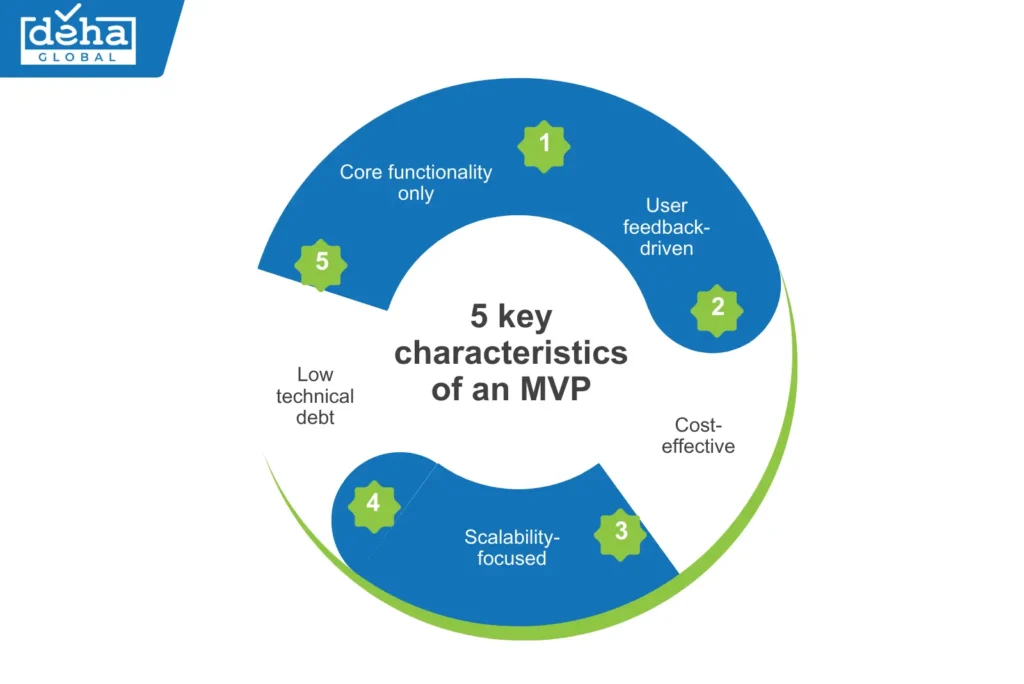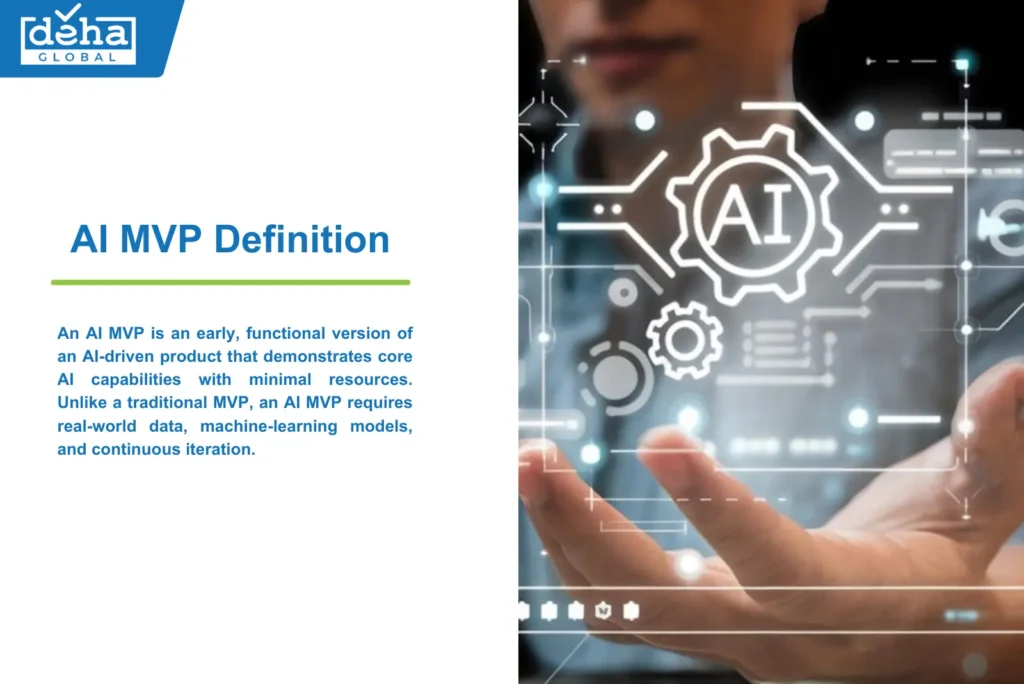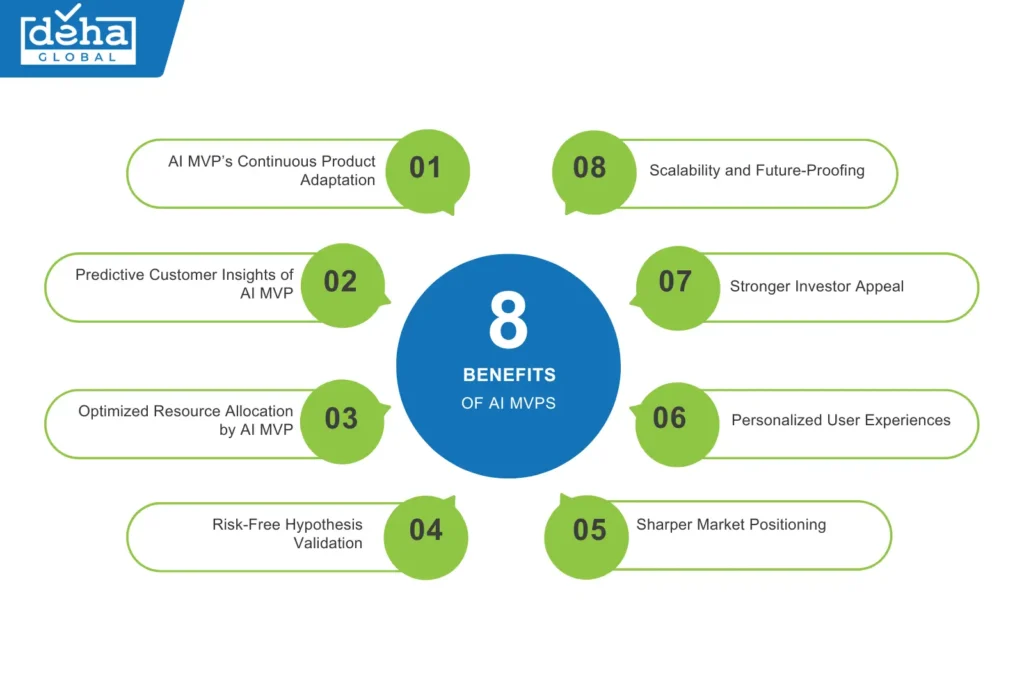Table of contents

Your company is considering an AI MVP but faces a critical challenge—validating its potential before committing to full-scale deployment. The key questions arise: How does an AI MVP differ from a standard MVP? How can it minimize risks and refine AI models before expansion? This article delves into the intricacies of AI MVP development, highlighting its transformative potential for business success in Singapore.
A Minimum Viable Product (MVP) is the simplest version that delivers core value while requiring minimal resources. It allows businesses to test market demand, validate ideas, and gather real-world user feedback before scaling. Instead of building a fully featured solution from scratch, an MVP focuses on the essential functions that effectively solve a specific problem.
For example, a new food delivery startup doesn’t need to launch with an extensive network of restaurants and advanced features like real-time order tracking. Instead, its MVP could start by partnering with a few local eateries and offering a simple online ordering system with manual delivery coordination. This approach minimizes development costs while proving the demand for the service.
An MVP follows a structured approach that helps businesses validate ideas with minimal risk and cost. It focuses on efficiency, rapid testing, and user-driven improvements. These key characteristics define a successful MVP:

An AI MVP is an early, functional version of a product that integrates AI to enhance processes and validate ideas quickly with minimal resources. Unlike a traditional MVP, an AI MVP focuses on testing the product’s core functionality while leveraging AI to improve efficiency and decision-making. It allows businesses to refine their AI integration strategy early, ensuring alignment with user needs and real-world feasibility before full-scale deployment.

To illustrate, an AI MVP for a fintech startup could be a basic fraud detection system analyzing transaction patterns to flag anomalies. The iterative learning process characteristic of an AI MVP makes it important for fine-tuning accuracy, which is appropriate when business owners want to scale AI-driven solutions efficiently.
An AI MVP must combine data-driven processes and machine learning components to deliver meaningful insights. Below are the key components essential for a successful AI-integrated MVP:
Each component of an AI MVP plays a vital role in transforming an idea into a functional AI-integrated product.
A well-executed AI MVP can benefit your business’s operations more than expected.

Traditional MVPs require manual updates, but AI MVPs evolve automatically. AI tracks user behavior in real time, detects patterns, and suggests optimizations without waiting for periodic feedback cycles. AI can recommend modifications or remove unnecessary elements if users aren’t engaging with a particular feature. This real-time adaptability ensures that the product stays aligned with market demands.
By eliminating the lag between feedback collection and implementation, businesses can maintain a competitive edge effortlessly.
Traditional MVPs rely on past user data, but AI MVPs can accurately predict future customer behavior.
AI forecasts the most valuable features in the long run by detecting engagement patterns. This predictive capability helps businesses develop features that users need before realizing it themselves.
Instead of waiting for feedback, companies can create a proactive product strategy based on AI-driven foresight. This leads to stronger user retention and better customer satisfaction over time.
Developing a product requires careful time and money management, and an AI MVP ensures that resources are used efficiently. AI identifies which features generate the most engagement and recommends areas where efforts should be intensified.
Businesses can pivot early if a feature isn’t performing well without wasting additional resources. This strategic approach minimizes unnecessary development costs while maximizing the return on investment.
An AI MVP provides a controlled environment for testing new ideas before committing to large-scale development. AI collects real-time data on how users interact with different features, allowing businesses to refine or pivot their approach as needed. This data-driven testing minimizes the risk of launching a product that doesn’t resonate with customers.
AI-integrated MVPs don’t just test functionality—they refine a product’s position in the market. AI analyzes customer behavior, competitor offerings, and industry trends to identify the best market entry strategy. Businesses can use these insights to craft messaging and branding that resonates with their ideal audience. This precision increases the chances of success and accelerates adoption.
Imagine an app that understands your preferences before you even realize them—this is the power of an AI MVP. AI learns from user behavior, tailors content, adjusts UI elements and customizes recommendations dynamically. Every user gets a unique experience, making the product feel intuitive and engaging.
Personalized experiences boost user satisfaction, increase retention rates, and turn casual users into loyal customers. Rather than a static product, businesses create an adaptive experience that evolves with their users’ needs.
Investors are more likely to fund startups demonstrating tangible growth potential, and an AI proves that. AI-powered analytics showcase real-time user adoption rates, engagement trends, and retention metrics—offering concrete data instead of speculative projections. With AI-driven insights, businesses can present a compelling case for scalability and revenue generation.
This transparency increases investor confidence and makes it easier to secure funding.
Imagine a scenario where your product gains traction, users pour in, and suddenly, your system crashes under the pressure. An AI MVP helps businesses avoid this nightmare by preparing for scalability from day one.
AI identifies potential bottlenecks, predicts how infrastructure will handle increased traffic, and suggests optimizations before issues arise. Instead of scrambling to fix problems after launching, businesses can ensure seamless growth from the start.
With AI’s predictive capabilities in an MVP, scaling up becomes a smooth, strategic transition rather than a chaotic challenge.
Businesses can drive efficiency, relevance, and measurable value from the start by focusing on these tailored applications.
Building an AI-driven product requires more than just a great idea; it also requires funding, technical expertise, and efficient execution. Despite having an exciting, original idea. Many companies in Singapore struggle with high costs, long development cycles, and uncertainty about competitive fit.
An AI MVP services provider can help reduce risk, accelerate time-to-market, and attract investors, helping businesses avoid overspending or missing out on important opportunities.
DEHA Global, specializing in AI MVP development, is an ideal solution. With experts with extensive experience in AI projects, DEHA Global analyzes market needs, technical challenges, and resource needs, then creates a clear roadmap for businesses to grow. The services include idea validation & consultation, AI MVP development, testing & optimization, and fundraising support.
By partnering with DEHA Global, your business will receive many benefits:
Don’t hesitate to contact DEHA Global immediately for a custom consultation about AI MVP development for your business using the best-suited AI strategy.